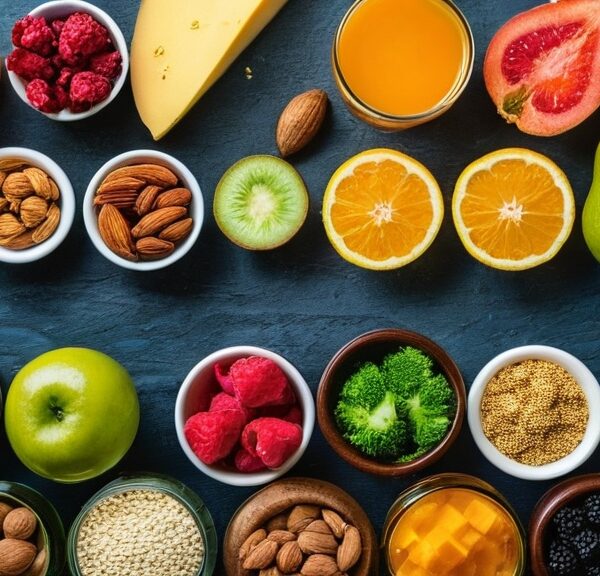Gut health refers to the balance of microorganisms living in the digestive tract. These microorganisms, including bacteria, fungi, and viruses, play a crucial role in digestion and overall health. A healthy gut supports nutrient absorption, immune function, and even mental well-being.
The gut microbiome is unique to each individual. Factors such as diet, lifestyle, and genetics shape this complex ecosystem. Maintaining a diverse microbiome is essential for optimal gut health and overall wellness.
Key Takeaways
- Gut health is essential for overall well-being and involves a balance of good and bad bacteria in the digestive system.
- Common digestive issues include bloating, gas, diarrhea, and constipation, which can indicate an imbalance in gut health.
- The gut-brain connection highlights the impact of mental health on gut health, with stress and anxiety affecting digestion.
- A diet rich in fiber, fermented foods, and low in processed foods can promote a healthy gut and reduce digestive issues.
- Probiotics and prebiotics can help restore the balance of good bacteria in the gut and improve overall digestive health.
Common Digestive Issues and Symptoms
Many people experience digestive issues at some point in their lives. Common problems include bloating, gas, constipation, and diarrhea. These symptoms can stem from various causes, including diet, stress, and underlying health conditions.
Identifying the root cause of digestive issues is vital for effective treatment. For instance, food intolerances or allergies can lead to discomfort after meals. Keeping a food diary can help pinpoint triggers and guide dietary changes.
The Gut-Brain Connection: How Mental Health Affects Gut Health

The gut-brain connection highlights the relationship between mental health and digestive function. Stress and anxiety can disrupt gut health, leading to symptoms like stomach cramps or changes in appetite. Conversely, an unhealthy gut can contribute to mood disorders.
Research shows that the gut produces neurotransmitters like serotonin, which influence mood. A balanced gut microbiome can support mental well-being. Understanding this connection emphasizes the importance of addressing both mental and digestive health.
The Role of Diet in Gut Health
Diet plays a significant role in maintaining gut health. Foods rich in fiber, such as fruits, vegetables, and whole grains, promote healthy digestion. Fiber acts as a prebiotic, feeding beneficial gut bacteria and supporting their growth.
On the other hand, a diet high in processed foods can harm gut health. Sugars and unhealthy fats may disrupt the balance of gut bacteria. Making conscious dietary choices can lead to improved digestive function and overall health.
Healing Your Gut: Probiotics and Prebiotics
Probiotics are live microorganisms that provide health benefits when consumed. They help restore balance to the gut microbiome, especially after antibiotic use or illness. Fermented foods like yogurt, kefir, and sauerkraut are excellent sources of probiotics.
Prebiotics are non-digestible fibers that feed beneficial bacteria in the gut. Foods like garlic, onions, and bananas contain prebiotics. Incorporating both probiotics and prebiotics into your diet can enhance gut health and support digestion.
Managing Stress for Better Gut Health

Stress management is crucial for maintaining gut health. Chronic stress can lead to inflammation and disrupt the balance of gut bacteria. Practicing relaxation techniques can help mitigate these effects.
Mindfulness practices such as meditation or yoga can reduce stress levels. Regularly engaging in these activities promotes a healthier gut environment. Prioritizing mental well-being ultimately supports digestive health.
The Impact of Exercise on Digestive Health
Regular physical activity benefits overall health, including digestive function. Exercise stimulates the digestive system, promoting regular bowel movements. It also helps reduce stress, which can positively impact gut health.
Different types of exercise can have varying effects on digestion. Aerobic activities like running or swimming can enhance gut motility. Strength training also contributes to overall well-being and supports a healthy microbiome.
Gut Health and Inflammation: Understanding the Link
Inflammation plays a significant role in gut health issues. Chronic inflammation can lead to conditions like irritable bowel syndrome (IBS) or inflammatory bowel disease (IBD). Understanding this link is essential for effective management.
Dietary choices significantly influence inflammation levels in the body. Foods rich in antioxidants, such as berries and leafy greens, can help reduce inflammation. Adopting an anti-inflammatory diet supports both gut health and overall wellness.
Natural Remedies for Gut Health Recovery
Many natural remedies can support gut health recovery. Herbal teas like ginger or peppermint can soothe digestive discomfort. Additionally, apple cider vinegar may aid digestion when consumed before meals.
Fermented foods also play a vital role in recovery. Incorporating kimchi or miso into your diet can introduce beneficial bacteria to your gut. These natural remedies can complement dietary changes for improved digestive health.
Seeking Professional Help: When to See a Doctor or Nutritionist
Sometimes, digestive issues require professional intervention. If symptoms persist despite lifestyle changes, seeking help is essential. A doctor or nutritionist can provide personalized guidance based on individual needs.
They may recommend tests to identify underlying conditions or food intolerances. Professional support ensures you receive appropriate treatment for your specific situation. Don’t hesitate to reach out for help when needed.
Long-Term Maintenance: Sustaining Gut Health for the Future
Maintaining gut health requires ongoing effort and commitment. Consistently making healthy dietary choices is crucial for long-term success. Regularly incorporating fiber-rich foods and probiotics into your meals supports a balanced microbiome.
Additionally, staying active and managing stress contributes to sustained gut health. Prioritizing self-care practices ensures you maintain a healthy lifestyle over time. By focusing on these aspects, you can enjoy lasting digestive wellness and overall well-being.
FAQs
What is gut health recovery?
Gut health recovery refers to the process of restoring and healing the digestive system, including the gut microbiome, after experiencing issues such as inflammation, imbalances, or damage.
Why is gut health important?
Gut health is important because the digestive system plays a crucial role in overall health, including nutrient absorption, immune function, and even mental health. A healthy gut microbiome is also linked to a reduced risk of various diseases.
What are some common signs of poor gut health?
Common signs of poor gut health include bloating, gas, diarrhea, constipation, food intolerances, fatigue, and frequent infections. Mental health issues such as anxiety and depression can also be linked to poor gut health.
What are some ways to promote gut health recovery?
Promoting gut health recovery can be achieved through a combination of dietary changes, probiotic and prebiotic supplementation, stress management, adequate sleep, and regular physical activity. Avoiding certain medications and environmental toxins can also support gut health.
How long does it take to recover gut health?
The time it takes to recover gut health can vary depending on the individual’s specific issues and the strategies used for recovery. Some people may see improvements in a matter of weeks, while others may require several months or longer to fully restore gut health.



